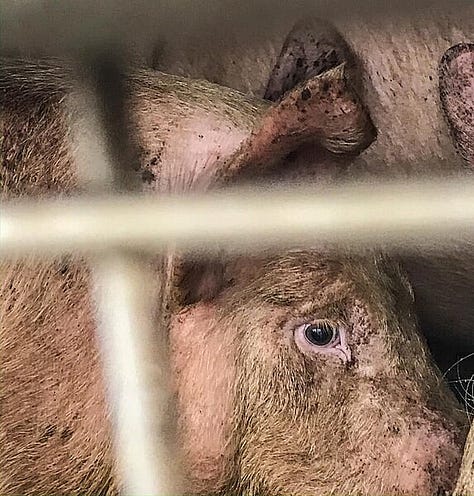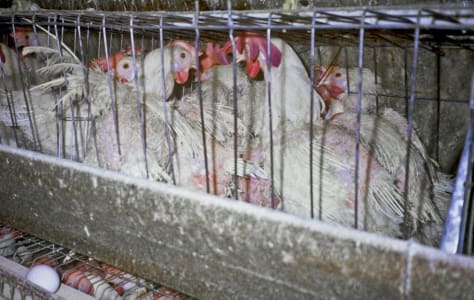
One of the biggest misconceptions surrounding animal agriculture is that it’s a natural, self-sustaining part of our economy. In reality, this industry is incredibly inefficient and could not survive without massive government subsidies funded by taxpayers.
Even despite the financial support, animal products remain more expensive than plant-based foods. A University of Oxford study compared food prices from 150 countries and found that switching to a plant-based diet reduces food costs by up to 30%. The researchers concluded that plant-based food patterns “were generally most affordable”.
Isn’t it absurd? While meat advocates often claim to be at the ‘top of the food chain,’ their food actually comes from a fragile industry that would be swallowed alive if it wasn’t continuously propped up with public funds. In a fair market, this industry wouldn’t stand a chance against a far more sustainable plant-based food system.
In today’s post, I will explain why this egregious misappropriation of public funds must end — and what you can do about it.
You’re reading Vegan Horizon. I deliver straight talk on veganism — brave, disruptive, to the point. To receive weekly updates via email, make sure you subscribe if you haven’t! 👇
The astronomical scale of livestock subsidies
The scale of subsidies supporting animal agriculture industry is staggering. Here are some numbers for illustration:
United States
According to data from ‘Meatonomics,’ the US spends a whopping $50 billion (more than 20 times the GDP of many smaller countries) on animal agriculture every year. Furthermore, about 30% of farm subsidies go to produce feed crops for dairy, eggs and meat, while only 4% go to fruits and vegetables.
US livestock farmers receive about 1,000 times more public funding than plant-based and cultivated meat. A study from UC Berkeley estimated that one pound of hamburger meat would actually cost $30 without any government subsidies.
European Union
Agricultural policy is the EU’s biggest cost item, with an annual budget of more than €55 billion, of which 82% is allocated to animal products. The EU reportedly spends nearly a fifth of its entire budget on subsidizing livestock farming. As analysts say: “Much like the wicked stepmother with her children in the world-known tale ‘Cinderella’, Europe does not treat all its farmers equally.”
On average, each head of cattle in Europe gets a subsidy worth $2.20 a day, which means that the tax-funded income of an EU dairy cow exceeds that of half the world's human population.
United Kingdom
In the UK, around 90% of the profit of farmers who graze livestock comes from agriculture subsidies, with some farmers only making £12,000 a year, even though they are given £44,000 in subsidies. Whilst, for comparison, only 10% of fruit farmers’ profit comes from subsidies.
Globally, the situation is equally alarming. It’s reported that over $1 million per minute is spent on farm subsidies worldwide, but only 1% of that figure is being used to benefit the environment.
Why is it irresponsible to subsidize animal agriculture?
Besides inflicting unspeakable suffering on billions of sentient beings, the livestock industry heavily contributes to our greatest global crises — from climate change, pandemic risk, environmental pollution, and rainforest destruction to species extinction, dying oceans, antibiotic resistance, and world hunger.
The most astounding fact: the industry is entirely superfluous. The largest organizations of dieticians in the world have long confirmed that animal products are not required for a healthy life. Research confirms that going vegan is not only the “single biggest way” to reduce your impact on Earth, but also brings significant health benefits.
Funding an industry as violent, destructive, and unnecessary as animal agriculture with billions of tax money defies all logic and is shockingly irresponsible.



Other market distortions
Government subsidies are by no means the only advantage the animal industry receives. Various other forms of government intervention further skew the playing field.
One notable example is the disparity in value added tax (VAT) rates between animal products and plant-based foods. In the EU, for example, animal products like cow's milk often enjoy a reduced VAT rate of as low as 6%, while plant-based alternatives can be taxed at rates as high as 23%.
Besides direct subsidies for farming and animal feed, taxpayer money is also often spent on advertising for animal products. Last year, the EU spent nearly 75 million euros in subsidies for the promotion of animal products, of which 29 million went to campaigns encouraging people to eat more meat. This was twice the amount spent in 2022.
Moreover, there are restrictions on how plant-based products can be marketed. For example, plant-based milks and cheeses are often prohibited from using terms like “milk” or “cheese” — even when the packaging clearly states that the products are vegan. This kind of regulation limits consumer understanding and access to sustainable plant-based alternatives.
Another example is the lack of accountability for damages caused by animal agriculture. In the US alone, the meat industry dodges $80-200 billion in annual costs related to pollution and waste management. If the hidden environmental and health costs were included, the true price of animal products would be prohibitively high.
Not a good time to waste taxpayer money
In times of soaring inflation, raging wars, shrinking government budgets, and looming economic downturn, subsidies are coming under increasing scrutiny. Pouring billions of hard-earned taxpayer dollars into animal agriculture is a glaring misuse of public funds, diverting money away from more sustainable, forward-thinking solutions that could foster economic resilience and long-term prosperity.
To avoid excessive state debt and tackle the pressing social and environmental crises of our time, it is imperative that governments question and adjust the allocation of their subsidies. Many companies, investors, and civil society organizations are pressing for such a reallocation. Even the United Nations is calling for the “repurposing of USD 470 billion of agricultural support that distorts prices, environment and social goals”.
Continuing to boost the animal agriculture industry through state financial injections is not only ecologically and ethically indefensible but also prohibitively expensive.
“People say that there isn’t money for climate but there is — it’s just in the wrong places. If we could repurpose the trillions of dollars being spent on wasteful subsidies and put these to better, greener uses, we could together address many of the planet's most pressing challenges.”
— Axel van Trotsenburg,
Senior Managing Director of the World Bank
Political demands
Here are three political actions that would help create a more sustainable food system:
Support fair competition
At a minimum, political leaders should reinstate a level playing field in the food sector by removing the market distortions that unfairly favor animal agriculture. This can be achieved by closing the VAT gap between animal products and plant-based foods, lifting marketing restrictions for vegan products, and ending unjustified livestock subsidies.
Align subsidies with societal interests
Policymakers have a duty to ensure that subsidies are directed towards industries that provide the greatest overall benefit to society. Therefore, agricultural subsidies should never be allocated merely based on production volume but should take into account each farm’s impact on humans, animals, climate, and the environment — which would automatically reduce the favor given to animal agriculture.Let food prices reflect the true costs of production
Taxes and regulations should be adjusted so that food prices reflect the true costs of production, including its environmental and health impacts. This honest pricing approach would likely lead to a sharp decline in animal product consumption. Studies from the University of Oxford estimate that a global shift to a plant-based food system by 2050 could save millions of lives and avoid $600 billion in climate damages as well as $1 trillion in healthcare costs.
TAKE ACTION
Taking meaningful action begins with our own choices. While holding political leaders accountable is crucial, we cannot rely solely on them to bring about the swift changes needed to address today’s global crises. The urgency of the situation demands that we take matters into our own hands.
Here’s what you can do:
1) Boycott animal products
One of the most powerful actions you can take is to stop supporting the very industry causing this harm. Every meal is a chance to vote with your wallet. Boycotting animal products — meat, dairy, eggs — sends a clear message that we won’t tolerate an industry built on environmental degradation, animal cruelty, and public health risks.
2) Reject pro-meat misinformation
Don’t fall for the misleading narrative that plant-based living is expensive or inaccessible. This perception is driven by deceptive marketing and rampant misinformation. In reality, studies show that living plant-based is cheaper and healthier.
3) Vote for politicians who champion animal & environmental protection
While we cannot rely solely on politics, it’s important to use your vote to support candidates and parties who actively advocate for animal rights and environmental sustainability — and thus a liveable future for us all.
4) Get active and inform others
Find effective ways to inform the people around you — family, friends, colleagues — about the benefits of vegan living and the urgent need to transition to a plant-based food system. Share articles, facts, and other resources that highlight these issues. The more people understand the real costs of animal agriculture, the stronger our collective push for change will be.
Vegan Horizon is a reader-supported publication. To receive new posts and support my work, consider becoming a free or paid subscriber. 👇





Thank you for gathering all these number, Pala! I wasn't aware of the scope of the problem.